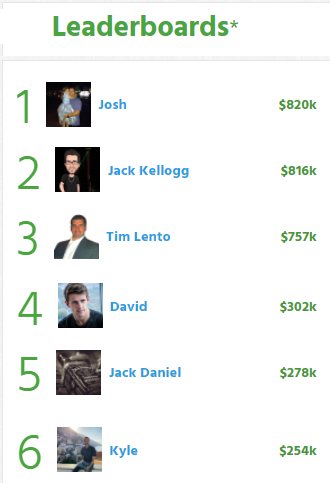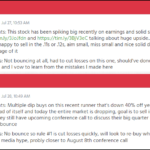
Hey Trader. Tim Here.
Nothing gets traders glued to their televisions like good, old-fashioned fear.
Financial news outlets love to gin up panic to get more eyeballs.
They parade pundits across the screen like the Westminster Dog Show.
Frankly, it’s shameful.
None of them bother to tell you the truth — panic creates opportunity on BOTH SIDES of the tape.
I teach this powerful concept to students early and often.
And right now, I want to show you how to apply it to your trading.
This universal idea works on everything from penny stocks to market indexes.
It’s so powerful that many of my top students are crushing it this year…
Compare these YTD figures to the S&P 500
Here’s what’s interesting about this particular leaderboard.
Jack Kellogg and Kyle, the lead trainers in StocksToTrade’s Breakouts and Breakdowns, trade totally opposite from one another.
Jack’s primarily a long trader while Kyle prefers shorts.
But both of them understand how to use panic when creating trade setups.
It all starts with identifying capitulation.
Pinpointing Panic
© Millionaire Media, LLC
Have you ever been in a trade that gets so bad, that you give up, close out the position, and eat the losses?
Now imagine everyone doing that all at once.
That’s what capitulation means.
It’s that point where you get so many sellers (or buyers) at once that there’s no one left to sell (or buy) the stock.
This phenomenon can occur on any type of asset.
Take the SPDR S&P 500 ETF Trust (ARCX: SPY) daily chart for example:
In the last few months, there have been a few capitulation events where stocks bottomed on volume that was more than double the average.
When I say this concept works on any chart, I do mean ANY chart.
Look at how capitulation created a low for the day in Sysorex Inc. (OTC: SYSX), a stock I’ve traded several times in the past few weeks.
The volume in this late morning candlestick was nearly 5x the volume seen the rest of the day — and a bit less than double the volume from the open.
Keep in mind that the SPY chart was a daily chart while this is a 10-minute chart.
And this can work for short plays as well.
Check out how capitulation played out in Better Therapeutics Inc. (NASDAQ: BTTX), a stock that Tim Bohen and StocksToTrade Advisory nailed on the upside.
I think this is incredible…
This stock, which many traders played to the long side, created a clear capitulation top that a short trader could’ve used for a setup.
How many other concepts can you use to trade both sides of the tape?
Creating a Setup
© Millionaire Media, LLC
Finding capitulation is fairly straightforward. You can use volume screeners to locate heavy trading in a particular stock.
The screener in our StocksToTrade platform does this incredibly well and allows you to filter tickers based on a stock’s float.
Ideally, you want the trading volume to be 2-3x or more than the average.
Intraday, it should be above the open volume by a significant amount (although it doesn’t necessarily have to be twice as much).
From there, you have two options…
First, you can wait for the next candle, with significantly lower volume, to take a position.
This is what that would look like in the chart above:
The problem is that you need to give the trade enough space to work, which can give you a larger drawdown than you prefer.
Second, you can wait for an obvious reversal after the capitulation moment, then use that as your entry point with the high (or low) as your stop.
Here’s what that would look like on the same chart:
This gives you a more defined setup with a clear risk/reward. However, you won’t always get as much potential profit as you might from a more aggressive entry.
Neither method is better than the other. It comes down to personal preference and context.
For example, if a stock experienced a Supernova pattern, there’s a lot of downside to cover. So, you can afford to wait for a crystal-clear topping signal before shorting the stock.
The Bottom Line
I don’t care who you are or what you trade … you MUST learn to identify and exploit panic.
Warren Buffet did it with Bank of America Corp. (NYSE: BAC) during the credit crisis.
This is how you can put the odds in your favor.
Supernovas are one of the easiest patterns to see this happen.
This single pattern helped me earn my first million.
And it’s a great place to start.
Click here to learn more about Supernova patterns.
—TIM
The post Turn Panic into Profits appeared first on Timothy Sykes.





